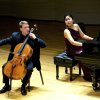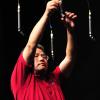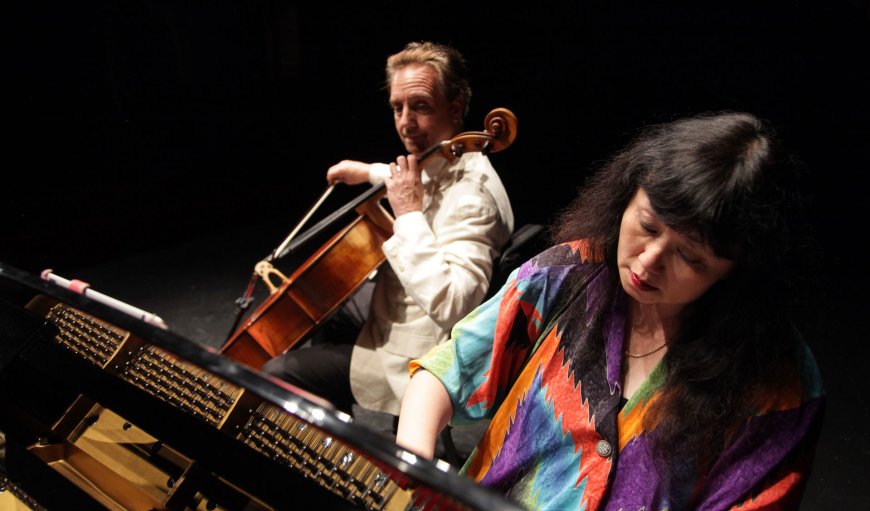
David Finckel and Wu Han recently announced that they will conclude their joint tenure as artistic directors of Music@Menlo after 25 years, stepping aside following the 2026 season.
But the husband-and-wife duo are hardly retiring and have no plans to decamp to a beach or spend time pruning roses. Right now, they’re gearing up for this summer at Menlo, with the usual array of world-class chamber concerts and other events set for July 18 – Aug. 9.
Longer term, Finckel and Wu Han intend to keep up their staggering schedule: performing (he on cello, she on piano), cultivating their wide network of residencies and mentoring programs around the country, and continuing to serve as artistic directors of the Chamber Music Society of Lincoln Center in New York City, where they live.
Their Upper West Side apartment wasn’t chosen for its proximity to the performing arts center, the couple told The New York Times in 2014, but rather because Fairway Market and the iconic Jewish deli Zabar’s are nearby.
Eating well, Finckel and Wu Han explained in a recent interview with SF Classical Voice, is a big part of how they maintain such an intense schedule.
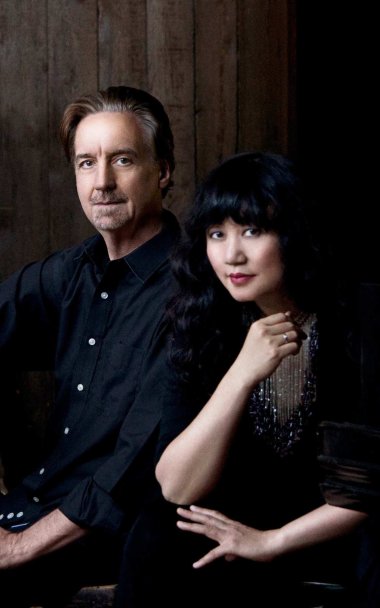
“When we’re home, every night we have a feast,” Finckel said. “Every day, the big discussion is, ‘What’s for dinner? What should we have tonight? And who shall we invite over?’ We try to have a little party every night. It’s a long day, and we get up very early, but at the end of the day, there’s a vacation.”
But music always comes first. The couple reserve every morning until noon for practice, which Wu Han said grounds everything.
She grew up in Taiwan and remembers the stack of records and the turntable that her father brought home from the flea market, which would change her life. Having access to a treasure trove of works by Mozart, Beethoven, Chopin, and Tchaikovsky taught her that classical music is for everyone.
“People say music is for elites. It’s not at all,” she said. “My father grew up on the street. He was kicked out of home by his stepmother when he was 14 years old, so he had no education. But he just loved music so, so much. Music sort of relieved [my parents] from the daily grind. They both went through the war, lost family, and suffered greatly.”
Finckel and Wu Han have devoted themselves to making sure everyone has access to the comforts and joys of classical music. And that means tending to both the audience and performer sides of the equation.
The couple’s exceptional drive to support young instrumentalists came out of what Finckel said was a sort of midlife crisis. About 25 years ago, both his father and violinist Isaac Stern, a mentor to the cellist as well as Wu Han, died.
“All of a sudden, instead of seeing Isaac Stern in front of me, I look behind me, and I see people lined up,” Finckel said. “Looking at me like I looked at him. When that happens to you as an artist, you either step up to the plate or you step back. Some people are not cut out to be called into service of music or to become, as [Dmitri] Shostakovich described it, a soldier of music. But we were. We had that in us.”
Having taken up that mantle, Finckel and Wu Han are, in a real sense, shaping the future of chamber music and ensuring that the art form continues to reach audiences around the U.S.
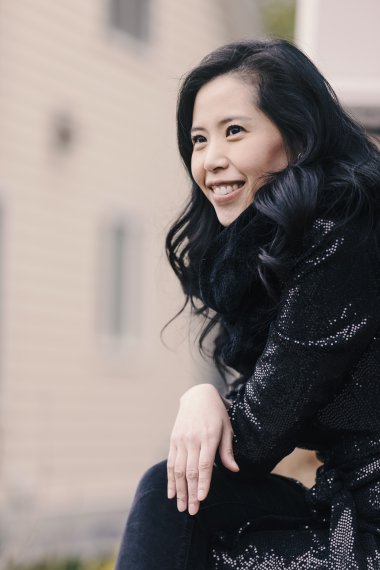
Pianist Gloria Chien is one of many in a now-established generation of musicians who have benefited from the couple’s mentoring. When she was 29, she attended Menlo’s Chamber Music Institute. In subsequent summers, she came back to coach younger musicians, and in 2010, she was appointed director of the institute, which she led for 10 years. Around that same time, she founded a chamber series in Chattanooga, Tennessee, and she’s expanded her reach since, becoming a co-artistic director of both the Lake Champlain Chamber Music Festival in Vermont and Chamber Music Northwest in Oregon.
Chien was literally breathless talking about how Finckel and Wu Han opened up her world. “Getting to work alongside David and Wu Han and watching them firsthand was very empowering [as] a young musician,” she said. “They are two of the most inexhaustible human beings. They are really tour-de-force artistic leaders in every way and very inspiring. They instilled in us this ‘anything is possible’ mentality.”
Chien explained how when she started as director of the Chamber Music Institute, Finckel and Wu Han provided active support. Then, once she had her footing, they let her know they trusted her. Of course, the couple were always available for any questions she had about marketing, fundraising, audience-building — things she didn’t learn about in conservatory. There’s a network of more than three dozen chamber organizations around the world started by Menlo alumni, and Finckel and Wu Han have lent their support to all of them.
“I’ve gone to them for advice on ‘Should we start a youth initiative?’” Chien said. “‘How should we do that?’ ‘How should I build relationships with this museum?’ ‘How can I talk to the board?’ They’ve always made a point to make time for me and for my friends. They let us know that they care and they’re there for us. It’s really an incredible gift.”
Wu Han said that Chien had what she and Finckel look for in artistic leaders: a strong work ethic, curiosity, common sense, and a desire to treat others well.
Those are traits that Finckel and Wu Han themselves have put into practice in order to create a collaborative atmosphere, said Suzanne Davidson, executive director of the Chamber Music Society of Lincoln Center.
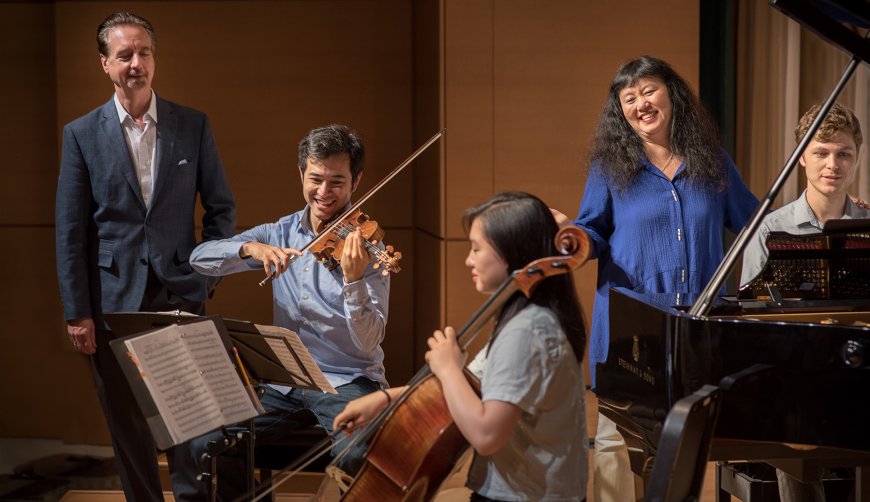
“Wu Han always says, ‘If you are not nice, no one will play with you,’” Davidson explained. “Chamber music — and it certainly comes from the artistic directors — is about relationships. It is about communication. It is about the intimacy of the art form, respect for each individual, for each musician, for each staff member.”
It isn’t just that Finckel and Wu Han do so much — Davidson called their sense of time “elastic” — but that they approach everything they do with care and excellence.
That’s something that struck scholar Ara Guzelimian, now artistic and executive director of the Ojai Music Festival, who has known the couple for decades and referred to them as “superhuman.” Take Music@Menlo. Most organizers, when starting a festival, would do it incrementally, Guzelimian said, but Finckel and Wu Han’s ambitions were larger.
Guzelimian highlighted the different levels of training programs for young musicians, as well as the lectures (dubbed Encounters at Menlo) that have been a part of the experience from the very beginning. “What most people would have done would have been start with a handful of high-level concerts with terrific musicians and congratulate themselves,” he said. “But what I love about David and Wu Han is they think big, they live it, and they realize it.”
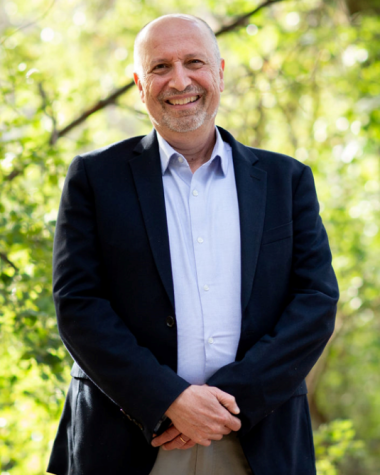
Guzelimian, who’s served as an Encounter leader at the festival since the first season, added that he’s met many young instrumentalists at the Chamber Music Institute who have gone on to significant careers, including violinists Stephen Waarts and Alexi Kenney and cellist Jay Campbell.
“I distinctly remember Stephen Waarts’s feet didn’t even quite reach the ground when I first heard him,” Guzelimian said. “And now he’s now playing with major orchestras around the world.”
Finckel and Wu Han have gone a step beyond with their mentoring approach, according to Guzelimian, broadening an existing program for young musicians at Lincoln Center by having them play side by side with more experienced pros — to the benefit of both generations.
“Young musicians, they’re gaining all the lived wisdom of the senior players and their deep knowledge of the pieces,” Guzelimian explained. “But the senior musicians are next to these fantastic young bucks, and they have to sit up a little straighter. They can’t rely on habits. There’s also the freshness that the young musicians are bringing to falling in love with these pieces for the first time, and so that animates the senior musicians in a very different way. It’s made for an incredibly lively and fresh environment.”
Guided by Finckel and Wu Han, chamber music is an ecosystem where different elements sustain each other, Guzelimian said. Performing informs mentoring, which in turn prepares young musicians to go out and create their own programs and festivals.
So you can trust that Music@Menlo will be in good hands for the forseeable. In their joint statement about stepping away, Finckel and Wu Han said, “We know the time has come to entrust [Menlo’s] future to new leadership. We do so with full confidence and great optimism, as we continue to tour and champion the art form that has shaped our lives.”


